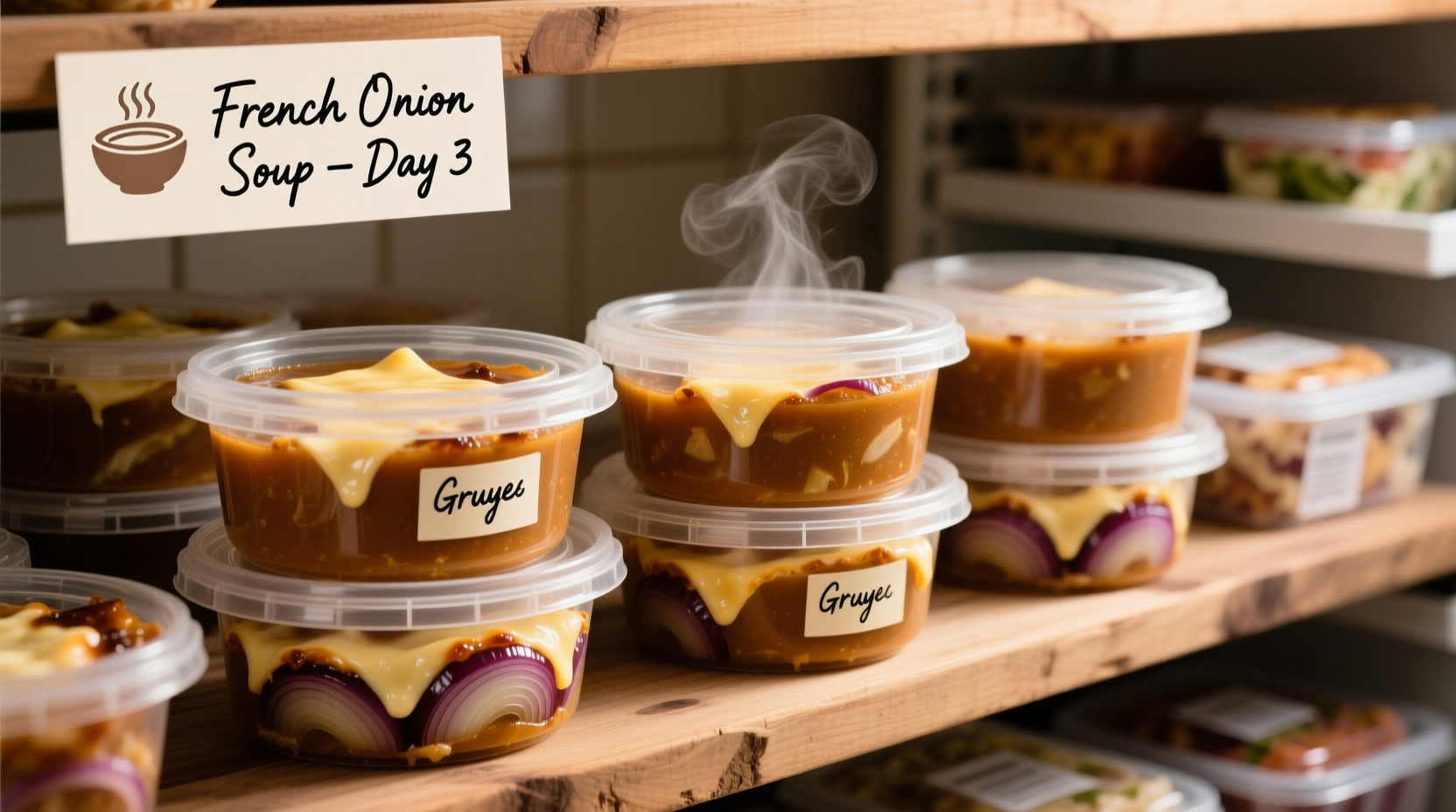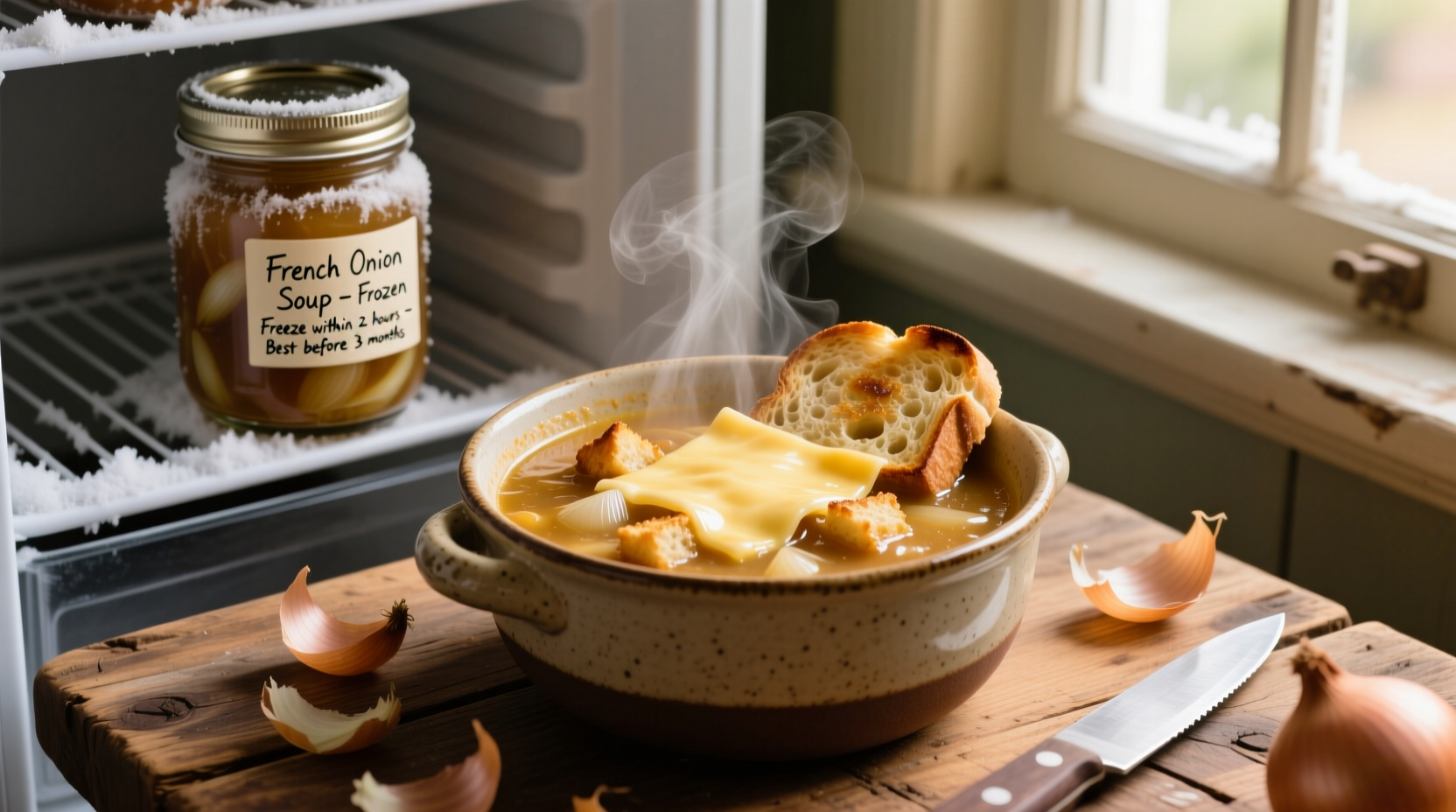Imagine pulling a perfectly preserved batch of your homemade French onion soup from the freezer on a chilly evening—ready to transform into a steaming, cheesy masterpiece in minutes. Freezing French onion soup isn't just possible; it's a brilliant kitchen strategy that preserves both time and flavor when executed properly. This guide delivers the exact techniques professional chefs use to maintain that rich, caramelized onion depth and velvety broth texture through the freezing process.
The Science Behind Freezing French Onion Soup
French onion soup's high broth content makes it particularly freezer-friendly compared to cream-based soups. The key factor determining success is proper cooling before freezing. According to USDA food safety guidelines, hot food should cool from 140°F to 70°F within 2 hours and reach 40°F within 4 hours to prevent bacterial growth. Rushing this step causes ice crystals that damage texture.
| Cooling Method | Time to Safe Temperature (70°F) | h>Texture Impact|
|---|---|---|
| Room Temperature (uncovered) | 4+ hours | High ice crystal formation, separated broth |
| Ice Water Bath (stirring) | 45-60 minutes | Minimal texture damage, best results |
| Shallow Containers (2-inch depth) | 2 hours | Moderate quality retention |
Step-by-Step Freezing Protocol
Follow this chef-approved method for optimal results:
- Cool rapidly using an ice water bath while stirring constantly for even temperature reduction
- Portion strategically into single-serving containers (2-3 cups) for convenient thawing
- Leave headspace—fill containers only ¾ full to accommodate expansion during freezing
- Remove air by pressing plastic wrap directly onto soup surface before sealing
- Label clearly with date and contents using freezer-safe markers

Storage Timeline & Quality Preservation
While technically safe indefinitely when frozen at 0°F, French onion soup maintains peak quality within specific timeframes:
- Weeks 1-4: Near-fresh quality, minimal texture changes
- Weeks 5-8: Slight flavor degradation, onions may soften further
- Weeks 9-12: Noticeable flavor loss, potential for freezer burn at edges
- Beyond 12 weeks: Significant quality deterioration, not recommended
Research from the National Center for Home Food Preservation confirms broth-based soups maintain optimal quality for 2-3 months when frozen using proper techniques. The critical factor isn't safety but flavor preservation—those complex caramelized onion notes gradually diminish over time.
Thawing & Reheating for Restaurant-Quality Results
How you handle frozen soup determines final quality:
Safe Thawing Methods
- Refrigerator method (best): Transfer container to fridge 24-48 hours before serving
- Cold water method (faster): Submerge sealed container in cold water, changing water every 30 minutes
- Never thaw at room temperature or in warm water
Professional Reheating Technique
- Warm soup gently over medium-low heat, stirring occasionally
- Never boil—simmer just until heated through (165°F internal temperature)
- Add finishing touches after reheating: fresh thyme, a splash of sherry, and of course, the signature cheese-bread topping
"The magic happens in the final presentation," explains Sophie Dubois, French culinary expert. "Freezing preserves the soul of the soup, but the finishing touches restore its spirit. Always add fresh cheese and toasted bread after reheating—never before freezing." This approach prevents the cheese from becoming rubbery and maintains the crisp-tender bread texture.
Special Considerations & Troubleshooting
French onion soup presents unique freezing considerations compared to other soups:
Context Boundaries: When Freezing Might Fail
- Cheese topping: Never freeze with melted cheese or bread—the texture becomes unappetizingly gummy
- Cream additions: If your recipe includes cream, expect slight separation (stir vigorously while reheating)
- Wine content: Higher alcohol content may slightly alter flavor profile after freezing
Fixing Common Post-Freezing Issues
- Separated broth: Whisk vigorously while reheating or use immersion blender briefly
- Dull flavor: Brighten with fresh lemon juice or additional salt
- Soft onions: Sauté additional onions separately and mix in after reheating
Maximizing Freezer Success: Pro Tips
- Freeze soup base without cheese topping, then add fresh elements when serving
- Use glass containers for best flavor retention (plastic may absorb onion odors)
- Portion into silicone molds for convenient soup cubes you can add directly to dishes
- Leave ½ inch space at top of containers—broth expands 10-15% when frozen
Frequently Asked Questions
Can you freeze French onion soup with cheese already melted on top?
No, freezing French onion soup with melted cheese creates a rubbery, unappetizing texture. Always freeze the soup base separately and add fresh cheese and toasted bread when serving for optimal results.
How long does homemade French onion soup last in the freezer?
Properly stored French onion soup maintains best quality for 2-3 months in the freezer. While safe indefinitely at 0°F, flavor and texture gradually deteriorate beyond this timeframe due to freezer burn and flavor degradation.
Why does my frozen French onion soup taste watery after reheating?
This typically occurs when soup wasn't cooled properly before freezing. Rapid cooling prevents large ice crystals that damage the broth's emulsion. To fix watery soup, simmer uncovered for 5-10 minutes to reduce and concentrate flavors, or add a small amount of cornstarch slurry.
Can you freeze French onion soup with wine in it?
Yes, wine-based French onion soup freezes well. The alcohol content doesn't negatively impact freezing, though some subtle flavor notes may diminish over time. For best results, use the same wine you would drink—quality matters more after freezing.











 浙公网安备
33010002000092号
浙公网安备
33010002000092号 浙B2-20120091-4
浙B2-20120091-4